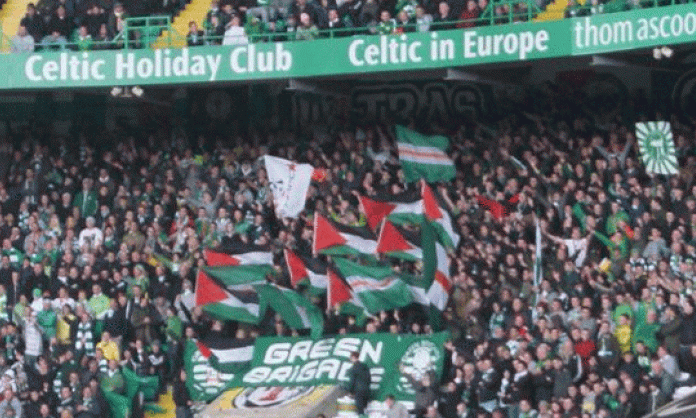“Contra el racismo, la represión y el fútbol negocio”
“Against racism, repression and football business”
– Slogan of Bukaneros, a fan group of Spanish football team Rayo Vallecano.
Depending on the team you support, being a football (soccer) fan can often be a struggle. But sometimes the game is about more than winning or losing a match – it’s about political struggle.
Most of the media focus on the activities of the skinhead thugs, racists and homophobes who perpetuate stereotypes about sports fans. The spotlight is rarely shone on the fans and players who take a progressive stand in the stadiums, or those who refuse to bow to the corporate masters of their clubs.
At the beginning of the 20th century, Celtic FC quickly became a rallying point for Irish Catholics facing discrimination in the shipyards and engineering factories of Glasgow in Scotland. Their rivalry with Glasgow Rangers, the team of the Protestant establishment, is one of the fiercest anywhere in the world.
The Green Brigade, formed in 2006, is the latest group of Celtic fans to put their politics into action. It describes itself as “a broad front of anti-fascist, anti-racist and anti-sectarian Celtic supporters”.
On Remembrance Day in November 2010, fans unfurled a banner in protest against the placement of a poppy on the team shirt. The banner read: “Your deeds would shame all the devils in hell. Ireland Iraq Afghanistan. No bloodstained poppy on our hoops.” (The Celtic jumper consists of green and white hoop stripes.)
During the last game of the season in 2012, the fans expressed solidarity with Palestinian hunger strikers, drawing links between the struggle against Israeli occupation and the struggle against British rule in Ireland. This time the banner read, “Dignity is More Precious than Food”. Dozens of fans flew Palestinian flags.
For Palestinians, football can be a dangerous game. In 2009, three members of the national team, Ayman Alkurd, Shadi Sbakhe and Wajeh Moshtahe, were among more than 1,000 people killed during the Israeli bombing of Gaza. The national football stadium and the offices of the national team were deliberately targeted and destroyed by Israeli forces.
In 2012, another Palestine player, Mahmood Sarsak, spent three months on hunger strike after being “administratively detained” by Israel, a non-charge that was arbitrarily renewed six times. He was finally released 97 days after initiating a hunger strike, having received support and solidarity from football fans and players around the world.
Soccer is popular across the Middle East. In Egypt, the most intense groups of fans, known as “ultras”, played a crucial political and practical role in the overthrow of hated dictator Hosni Mubarak. Their experience in fighting the Egyptian police proved pivotal in the defence of Tahrir Square in the face of multiple attacks, including the now infamous “battle of the camels”.
In Turkey, during mass anti-government protests and the occupation of Taksim Square in 2013, organised football supporters united against the violence of the riot police. Fans from city’s most bitterly opposed clubs – Besiktas, Galatasaray and Fenerbahce – marched arm in arm under the slogan “Istanbul United”.
They threw the tear gas canisters back at police lines and helped build barricades to protect protesters. An 18-year-old ultra was reported at the time saying, “We are normally enemies, but this has really brought us together. It’s never happened before.”
Perhaps the most stridently anti-establishment club is based in Hamburg, Germany: FC St Pauli. Since the 1980s, supporters have been involved in militant anti-fascist and anti-racist activism as well as refugee solidarity. Last year, the club donated free drinks and fan gear to West African refugees living in Hamburg as well as free tickets to every home game. On 25 October, amid a growing pro-refugee movement in the city, St. Pauli fans organised a solidarity demonstration, taking 10,000 people onto the streets in protest after a game.
The slogan that unifies left wing football fans around the world is “ACAB” (All Cops are Bastards). That’s a cry we can proudly support during this year’s World Cup.





